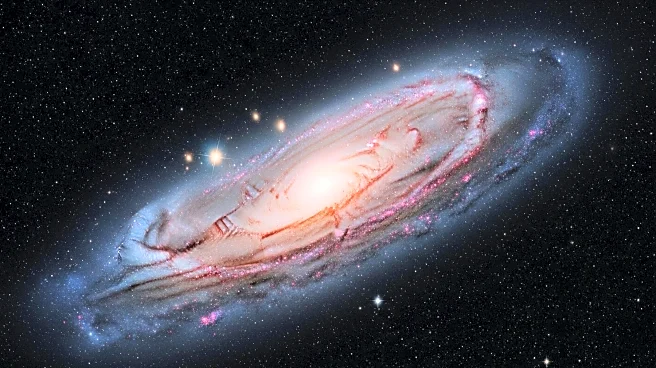What is the story about?
What's Happening?
Recent studies have raised questions about the nature of dark energy, suggesting it may not be a constant as previously thought. The prevailing cosmological model, known as ΛCDM, posits that the universe is composed of approximately 70% dark energy, 25% dark matter, and 5% normal matter. However, new evidence indicates that dark energy might be evolving over time, challenging the notion of it being a cosmological constant. This debate has been fueled by discrepancies in measurements of the universe's expansion rate, known as the Hubble tension, which shows conflicting results from different methods such as the cosmic microwave background (CMB) and supernova observations. The Dark Energy Spectroscopic Instrument (DESI) has provided data suggesting a slight evolution in dark energy, but the evidence remains inconclusive.
Why It's Important?
The implications of dark energy evolving are significant for our understanding of the universe's expansion and its ultimate fate. If dark energy is indeed changing, it could affect predictions about the universe's future, potentially altering theories about its eventual collapse or continued expansion. This debate impacts cosmology and astrophysics, as researchers strive to reconcile these findings with existing models. The resolution of the Hubble tension could lead to a paradigm shift in how scientists understand cosmic forces and the universe's composition, influencing future research directions and technological advancements in space exploration.
What's Next?
The scientific community is awaiting more precise data from upcoming missions such as ESA's Euclid, NASA's SPHEREx, and the Vera C. Rubin Observatory. These missions are expected to provide higher-quality data that could clarify the nature of dark energy and resolve current tensions in cosmological measurements. Researchers are also exploring alternative explanations for the observed discrepancies, including potential errors in data or the existence of other exotic forms of matter or energy. The ongoing debate is likely to continue as new evidence emerges, with scientists remaining cautious about drawing definitive conclusions until more robust data is available.
Beyond the Headlines
The discussion around dark energy's evolution touches on broader philosophical questions about the universe's nature and our place within it. It challenges the assumptions of a static universe and opens up possibilities for new theories that could redefine our understanding of cosmic history. The debate also highlights the complexities of scientific inquiry, where multiple interpretations of data can coexist, prompting a reevaluation of established scientific principles. As researchers delve deeper into these mysteries, the ethical considerations of scientific exploration and the pursuit of knowledge become increasingly relevant.


















